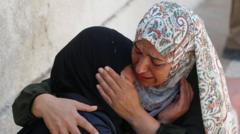The ongoing conflict between Israel and Iran, which reignited on Friday, has resulted in heavy casualties and significant military actions from both sides. Israel launched Operation Rising Lion, targeting Iran's nuclear facilities and military sites, prompting a severe response from Iran. With over 220 reported deaths in Iran and increasing tensions with the U.S., both nations find themselves on the brink of a potential wider conflict, with political implications reaching beyond the region.
Escalating Tensions: The Israel-Iran Conflict Unfolds

Escalating Tensions: The Israel-Iran Conflict Unfolds
Recent military exchanges between Israel and Iran have escalated sharply, raising concerns over a wider regional conflict.
In the latest surge of violence, an intense back-and-forth of missile strikes has characterized the conflict, intensifying fears of an impending war. The situation escalated dramatically when Israeli forces initiated air raids on Iranian nuclear facilities, claiming that these targets were critical to preventing Iran from acquiring nuclear weapons. Prime Minister Benjamin Netanyahu justified the strikes under the premise of national security, asserting that “the heart” of Iran’s nuclear program was under attack.
Iran's immediate retaliation followed suite, marked by missile strikes aimed at various military installations within Israel. Despite Israel's robust Iron Dome defense system intercepting numerous Iranian missiles, civilian casualties have not been spared, leading to rising tensions and allegations of deliberate targeting by both parties. The humanitarian implications are severe; reports indicate significant casualties on both sides, with Iran claiming a death toll of 224, while Israel cites 24 fatalities.
The ongoing military hostilities prompted U.S. President Donald Trump to contemplate American involvement in the conflict, which raises international stakes. Trump’s administration is under pressure to respond forcibly to the Iranian missile attacks, as public sentiment in Israel urges stronger U.S. backing. The implications of any U.S. military intervention are significant, as it might further destabilize the Middle East and draw in other players into the conflict.
As both nations prepare for likely further military action, questions linger about the effectiveness of diplomatic solutions to curb the burgeoning conflict. The recent aggressive military engagements seem to signal a breakdown in dialogue regarding Iran’s nuclear ambitions, heavily complicating long-standing efforts to negotiate peace in the region. International bodies, previously monitoring Iran's nuclear undertakings, have voiced concerns, leading to increased scrutiny over the nation’s activities amid the crisis.
As the conflict grinds on and with both sides unwilling to back down, the question remains: How will the international community respond to this immediate threat as hostilities continue to escalate? The world watches anxiously, awaiting the next chapter in this enduring geopolitical struggle.
Iran's immediate retaliation followed suite, marked by missile strikes aimed at various military installations within Israel. Despite Israel's robust Iron Dome defense system intercepting numerous Iranian missiles, civilian casualties have not been spared, leading to rising tensions and allegations of deliberate targeting by both parties. The humanitarian implications are severe; reports indicate significant casualties on both sides, with Iran claiming a death toll of 224, while Israel cites 24 fatalities.
The ongoing military hostilities prompted U.S. President Donald Trump to contemplate American involvement in the conflict, which raises international stakes. Trump’s administration is under pressure to respond forcibly to the Iranian missile attacks, as public sentiment in Israel urges stronger U.S. backing. The implications of any U.S. military intervention are significant, as it might further destabilize the Middle East and draw in other players into the conflict.
As both nations prepare for likely further military action, questions linger about the effectiveness of diplomatic solutions to curb the burgeoning conflict. The recent aggressive military engagements seem to signal a breakdown in dialogue regarding Iran’s nuclear ambitions, heavily complicating long-standing efforts to negotiate peace in the region. International bodies, previously monitoring Iran's nuclear undertakings, have voiced concerns, leading to increased scrutiny over the nation’s activities amid the crisis.
As the conflict grinds on and with both sides unwilling to back down, the question remains: How will the international community respond to this immediate threat as hostilities continue to escalate? The world watches anxiously, awaiting the next chapter in this enduring geopolitical struggle.





















